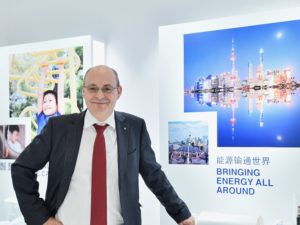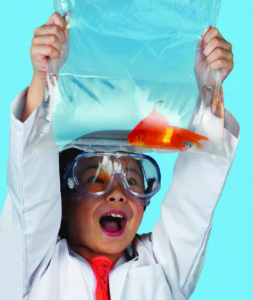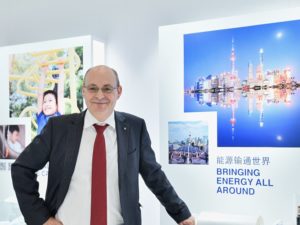Celebrating the company’s 20th anniversary, CEO of Borouge Pte Ltd, Wim Roels shares his thoughts with Packaging MEA editor Ben Daniel on the company’s impressive journey of operational excellence and remarkable growth and innovation. With Anteo, a new family of linear low density polyethylene (LLDPE) packaging grades, Wim highlighted the company’s drive to bring to the market differentiated products that have a positive impact on the converters business and environment too.

Benjamin Daniel (Ben):
You have achieved a lot in terms of products, volumes and sales. What does this mean to you? In a nutshell how do you see your journey of 20 years?
Wim Roels (Wim): A journey like this of course has some challenges. We have built Borouge from the grassroots to where it is today.
Looking back at the past 20 years, I’d say the biggest achievement was that we built a professional company. This means putting in place a professional team of people who have been able to accomplish this growth, build these plants, develop the new products and build the sales channels wherever we are in the Middle East and Asia.
Throughout the last two decades, we have built and strengthened successful partnerships with the value chain through which we contributed to enhancing our innovative solutions, supporting customers’ businesses and supporting communities through various environmental initiatives and programmes.
Ben: One of your major achievements over the past year has been AnteoTM. Isn’t it?
Wim: Yes, it’s our new ingredient for complete success in flexible packaging. It is a new family of linear low density polyethylene (LLDPE) packaging grades for the global packaging market. We launched AnteoTM globally together with Borealis in October 2017. Developed using Borealis’ Borstar® Bimodal Terpolymer (BBT) Technology, AnteoTM is being produced at Borouge’s industrial complex in Ruwais for the first time in the UAE. AnteoTM signifies our drive to bring to the market differentiated products that have a positive impact on the business of our customers, and environment too.
Ben: What’s the USP of AnteoTM?
Wim: It is capable of processing at lower extruder pressure, better sealing integrity and improved puncture resistance in combination with strong optics for enhanced shelf appeal.
To begin with, we have introduced two grades in the AnteoTM family – FK1820 and FK1828, and I can tell you that more will follow.
Ben: Borouge’s petrochemicals complex is expanding by having your fifth polypropylene unit (PP5) which will contribute to increasing the company’s total polymer capacity from 4.5 to 5 million tonnes per year. So, will the plant reach out to a wider global demand?
Wim: In Borouge we have a very clear strategy of growth. We want to grow and want to continue our journey of growth. PP5 is one step in the whole journey.
We see the market growing and we are also optimistic and we believe that the market will sustain its growth. These are big, long-term investments, built for the next 30 years. We believe, like polypropylene, polyethylene will also see a significant and healthy growth in the next 20 to 30 years. We want to be a part of this growth and we will continue to invest in new facilities.
Ben: The world of packaging is changing, both in the flexible as well as rigid packaging sectors. As the CEO, how do you see Borouge playing a role of a game changer? What’s your vision and what’s your contribution going to be?
Wim: Packaging is a huge area and under this huge umbrella are many fields. One of the challenges we see, especially for the single use plastics, is marine littering. It is an important area, which the industry needs to address. At Borouge, we’d like to be a catalyst, bringing people together in this endeavour.
I do believe that there will be a significant change in the field of packaging, moving towards a circular economy. We need to support and enable recycling of packaging material. It will not happen on its own; it will need support, encouragement and the industry value chain to work with all the stakeholders, including governments.
Secondly, I also believe that there will be new ways of packing things. Plastic is a vital material for packaging. It’s versatile, easy to use and form, and is cheap. These capabilities perhaps may be part of the problem of excess packaging material. Without a proper collection and disposal mechanism, it ends up in the environment.
We believe that over time we will see different types of packaging like returnable packaging, closed loop packaging – you use it, you fill it and take it back, though this may not be for every sector within packaging.
Ben: Is there one solution that will solve all the problems?
Wim: I don’t think so. Different solutions will address specific segments of packaging. We are doing it by devising new packaging concepts which can reduce the amount of packaging, recycle the packaging material, back- into-packaging, recycling it into energy, which is better than just throwing it away.
As I said, we are doing our bit. How it will shape up, I don’t know. And I don’t think anybody does. But I believe that five years from now, there will be significant improvements in the packaging than it is today. We are committed to be part of the process that shapes it.
Ben: You have started ‘Project STOP’ in Indonesia. What’s it about?
Wim: The Project, in a small town in Indonesia, addresses a specific waste stream. Instead of plastics flooded into the sea after their use, it’s being taken, recycled and reused. So, besides curbing the problem of waste eliminating into the sea, it also creates jobs for the local population.
We have partnered with Borealis and SYSTEMIQ who co-founded Project STOP in line with our commitment to work with our value chain partners to stop plastics from entering the oceans after their end of life. Through this Project, we contribute to unlocking new opportunities to improve waste management practices and promote plastics circular economy.
Ben: Are we going to see Borouge replicate ‘Project STOP’ in the UAE?
Wim: I think an initiative like ‘Project STOP’ can be replicated in many places around the world. As I said, we are open to partnering with as many companies who would like to participate and contribute, be it here in the UAE, in India, in Africa or other parts of Asia.
Ben: What about other parts of the world?
Wim: ‘Project STOP ‘may not be a solution for all the places. Where you
have a well-functioning, well-organised waste management system, you probably need something different. It can be recycling capabilities, off- taking recycled material to create new applications. It’s important to find right solutions.
Ben: So, UAE has a waste collection and management system. What do you think is the challenge?
Wim: I think the challenge is separating plastic materials after their end of life from the main waste and then recycling them.
I am happy to inform that we have a project team specifically looking at how we can contribute to create that recycling feed here in the UAE.
Ben: The European and North America manufactured converting machines are running your products quite well. But there are some Asia machines with issues such as consistency, performance and repeatability. Do you have solutions to counter for such issues?
Wim: If you looked around the Arabplast, you may have seen some Asian machines running on Borouge material. So we have close cooperation with machine manufacturers in India, China, and Taiwan, because at the end of the day, we want our products to work fine with any reasonable quality machines.
We are aware that many converters in the Middle East and Asia use Asian machines. They are cheaper, have a cost advantage, and many of them have a performance, which is reasonably close to European standards. In general all of our materials run well on all Asian machines.

“Superior full solution completes flexible packaging offer”



